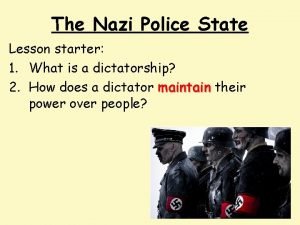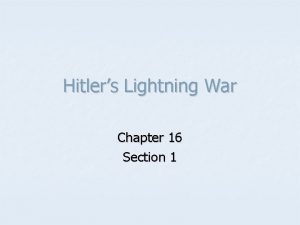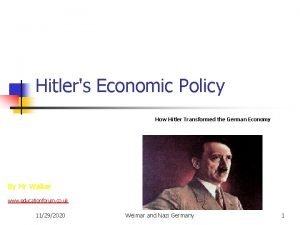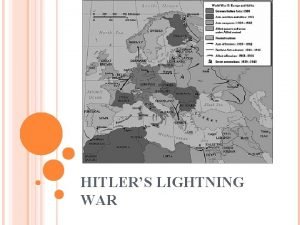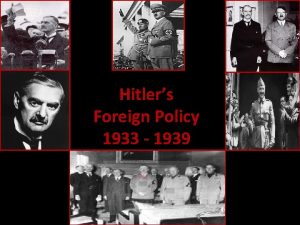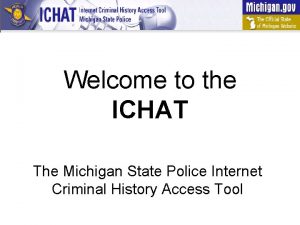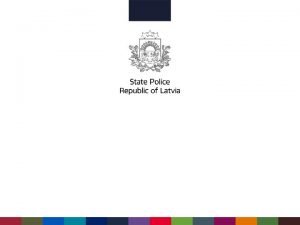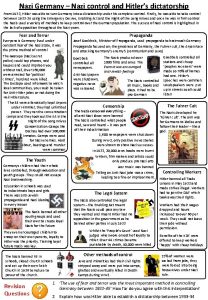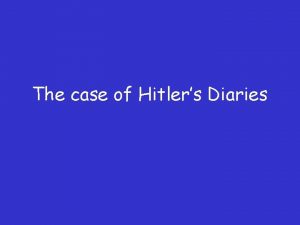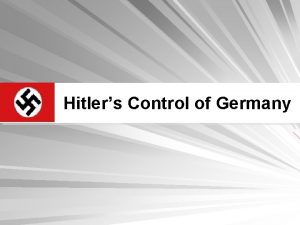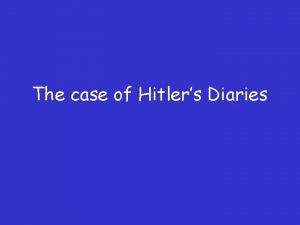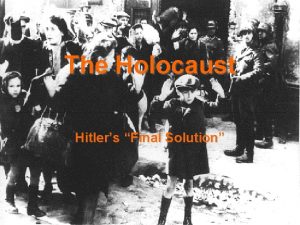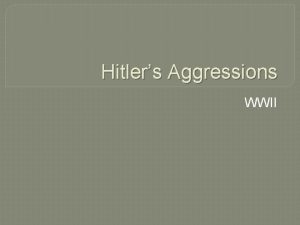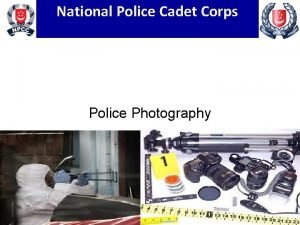The Nazi Police State Hitlers Concept of Law















- Slides: 15

The Nazi Police State

Hitler’s Concept of Law • Hitler did not believe in ‘the rule of law’ in any way • For Hitler a legitimacy (the right to rule) came from the fuhrerprincip and nowhere else • Hitler’s word was literally law • From the Enabling Act onwards Germans lost their legal rights (e. g. The right to a fair trial, equality before the law, right to free expression) • In Hitler’s Germany people could be arrested, imprisoned, executed without charge or trial

Nazi ideas on Criminality • For the Nazis crime was defined by reference to Nazi ideology. • Those outside the ‘Peoples Community’ were by definition criminals RACIALLY – non Aryans – Slavs, Jews, black people, gypsies IDELOGICALLY – Marxists, socialists, liberals – placed into camps for ‘re-education’ MORALLY – criminals, homosexuals, alcoholics, mentally ill, dug abusers – seen as a threat to racial purity

The Institutions of the Nazi Police State • • The SA The Peoples Court The SS The Concentration Camps The SD The Gestapo Informers and block leaders

The SA (Sturmabteilung, Storm Troopers)AKA "Brown Shirts, " • Nazi Party militia that helped Adolf Hitler rise to power in Germany, created in 1922 • the SA's purpose was to guard Nazi Party meetings, but in actuality, Hitler meant for the group to serve as the Nazi army. • The SA was extremely antisemitic and antidemocratic in its military activities. Its members were mainly lower-middle class Germans who had lost their jobs due to the country's economic problems. The SA gave them something to be part of and proud of.

SA continued… • They engaged in street fights with their political enemies • When Hitler rose to national power in 1933 the SA became an official government organization and had around 4 million members • When Leader Ernst Rohm showed signs of wanting to take control of the army and rebel against Hitler in a military coup, the SS massacred him and other SA leaders in the "Night of the Long Knives"- --June 30, 1934. • From then on, the SA was no longer a dominant organization within the Reich, but it continued to exist, its members guarding concentration camps and terrorizing enemies of the Nazi regime.


The Peoples Court • The Nazis kept, but nazified, the existing criminal courts and added a new Peoples Court for political offences • Headed by the infamous Roland Freisler there were no juries or defendants in the people’s court, just charges, abuse, humiliation and sentencing • Between 1934 -39 3400 communists and socialists were processed by the People’s Court – the usual sentence was execution by axe

The police in Nazi Germany • The following Police organisations existed in 1933: The SS – controlled by Himmler The SD – an intelligence gathering wing of the SS The SA – inititially controlled by Rohm – SA maintained police powers throughout The Gestapo (secret state police) – headed by Goring Gradually the SS took more and more control. In 1936 Himmler given control of SS, SD and Gestapo and by 1939 Himmler and the SS controlled all state police organisations

The SS (Schutzstaffel) Role 1. Personal bodyguard for Hitler 2. Controlled state police organisation in 3 rd Reich 3. Camps – SS controlled the concentration camps 4. Ideology – SS seen as ideological role model for Germans – racially pure and unquestioningly obedient 5. Military – Waffen SS (armed) had its own army divisions 6. Government – SS charged with administering occupied and conquered territories 7. Economic – SS ran a number of business enterprises based on the slave labour of concentration camp inmates


Concentration Camps • The original concentration camps were prison camps not extermination camps (these came after 1942) • A network of camps emerged 1933 -36 including; Sachsenhausen, Buchenwald, Mauthausen, Ravensbruck (women only) • The original purpose was for political prisoners to be re -educated. By 1936 political opposition had been largely crushed and the camps started to be used for ‘undesirables’, asocials, homosexuals, gypsies, non Aryans with a view to ‘purifying the race’ • This change in purpose saw a marked increase in brutality and murders in the camps

SD (Sicherheitsdienst) • The SD was the internal security service in Nazi Germany led by Reinhardt Heydrich • Its role was to investigate claims that the Nazi party itself or its institutions had been infiltrated by enemies • The SD also spent a great deal of time monitoring public opinion and investigating who had voted ‘no’ in the plebiscites • The SD was manned by committed volunteers

The Gestapo (State Secret Police) • German people were terrified by the Gestapo believing them to be everywhere – workplace, pub, club, residential block etc. • The reality was rather different – only 20, 000 officers for whole of Germany • The Gestapo however had a deserved reputation for brutality • They relied on informers for information – party members were encouraged to spy on their neighbours, Hitler Youth were encouraged to squeal on their parents. Every residential block had a ‘Block leader’ who reported suspicious activity to the Gestapo • In some ways the German people could be seen as practising ‘self surveillance’

 Nazi police state lesson
Nazi police state lesson Nazi police state
Nazi police state Hitlers lieblingslied
Hitlers lieblingslied Chapter 16 section 1 hitlers lighting war
Chapter 16 section 1 hitlers lighting war Hitlers economic policy
Hitlers economic policy Who were hitlers parents
Who were hitlers parents Why did hitler set his sights on poland next
Why did hitler set his sights on poland next Hitlers foreign policy
Hitlers foreign policy Newton's first law and second law and third law
Newton's first law and second law and third law Si unit of newton's first law
Si unit of newton's first law Boyles law
Boyles law Charles law constant
Charles law constant Ichat michigan
Ichat michigan Michigan state police teenage defensive driving
Michigan state police teenage defensive driving Latvian state police
Latvian state police Pa state police commercial vehicle safety division
Pa state police commercial vehicle safety division
